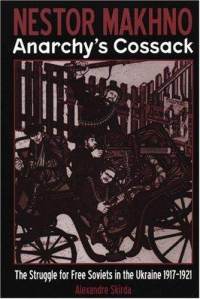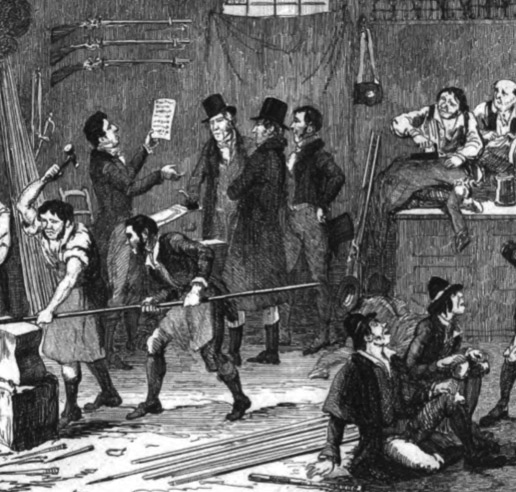Over 30 years of anarchist writing from Ireland listed under hundreds of topics
Review
Talking about Sexual Violence. Report from the RAG dayschool
In June, the women members of the WSM hosted a dayschool on Women in Revolutionary Struggle. Following on from this, RAG (Revolutionary Anarcho-Feminist Group) decided to host a women's only day-school on sexual violence. This was held in the in the new Seomra Spraoi space in Dublin.
Review: The Wind That Shakes The Barley
I'm just after returning from watching Ken Loach's Palm D'or reaping drama 'The Wind That Shakes The Barley' and like most feel slightly compelled to add one or two words to the flurry of type and hype that has accompanied the movies release on these shores. The Wind That Shakes The Barley is a typical Loach movie portraying many of the core techniques of his previous outtings. Again he relies on plunging a shallowly crafted personal relationship, this time between two brothers, into a set of tragic circumstances. These circumstances provide an emotional cover for his overly didactic political approach to popularising alternative historical mythologies that challenge the authors of a victors' history. This time the contested historicity is the rabid nationalism of the Irish text book, that sweeps aside socialist and labour based movements in the process of consolidation of the free state.
Book review: The rebel sell
An interesting but deeply flawed book which is worth reading for its powerful deconstruction of the claims of the counterculture to be revolutionary, despite its utter confusion on the significant differences between anarchism and countercultural ideas
An anarchist look at V For Vendetta
V for Vendetta was originally a graphic novel written in the 80's by Alan Moore about a man taking on a fascistic regime and promoting "Anarchy". The comic was full of choice quotes on the nature of the state, justice and the struggle for a free society. The main character, "V", is an 18th century style "propaganda by the deed" anarchist who spends his time blowing up buildings and murdering people, it's all very exciting if not somewhat cliché.
Anarchy's Cossak Nestor Makhno - Review
 The Makhnovists were a libertarian movement, deeply rooted in the traditions of anarchist-communism, that developed an experience of revolutionary changes in the economic and political structures of the backwarded Ukrainian society.
The Makhnovists were a libertarian movement, deeply rooted in the traditions of anarchist-communism, that developed an experience of revolutionary changes in the economic and political structures of the backwarded Ukrainian society.
Review: Chomsky on anarchism
This book is a collection of essays by and interviews on anarchism with the man who has recently been voted the most popular intellectual in the world, (not that he was very impressed by that!)
Book Review: Parecon: Life After Capitalism
Anarchists, in common with all radical proponents of social change are continually asked what their vision of a new society/economy is. What is the "Master Plan", the "Blueprint" that will be followed? We are justifiably wary of outlining any "Blueprint" for an anarchist society that would suggest that it is THE solution and should be followed to the letter - who would enforce this great master plan after all!?
Book Review: To Live
For many people the 'civil war' within the Civil War that occurred in Spain between 1936-39 is a difficult business to understand. Not only were many different organisations involved, but it was set against the background of an even larger conflict that in itself was rife with brutality and betrayal. Although it appears at times to be an impossible quagmire to make sense of, Mick Parkin has succeeded admirably in his short novel To Live.
"Direct Action" by Emile Pouget and "A Day Mournful and Overcast" by an Uncontrollable of the Iron Column
A passion for freedom, opposition to all forms of hierarchy and the advocacy and use of direct action have historically been some of the most important and enduring characteristics of anarchist politics. The recent publication by the Kate Sharpley Library, of two pamphlets provides us with a glimpse of how these ideas and practices have evolved over time.
Robert Emmet and the rising of 1803
 The 1803 rebellion came to be associated with one man, Robert Emmet because that suited both the government of that time and later day nationalists in search of a romantic nationalist interpretation of the rebellion. As with the great rebellion of 1798, the process of burying the radical ideas of the rebellion was bound up in creating mystical notions of blood sacrifice and individual heroism.
The 1803 rebellion came to be associated with one man, Robert Emmet because that suited both the government of that time and later day nationalists in search of a romantic nationalist interpretation of the rebellion. As with the great rebellion of 1798, the process of burying the radical ideas of the rebellion was bound up in creating mystical notions of blood sacrifice and individual heroism.
The bi-centennary of the 1798 rebellion saw the radical ideas that lay at the roots of it being recovered. Instead of a romantic nationalist rising for the four green fields and the faith of our fathers it was put in the context of the wave of European / Atlantic radicalism that demanded equality for all. The United Irishmen were revealed not as narrow nationalists but as part of an international democratic upsurge against monarchy and colonialism that transformed the world we live in.

